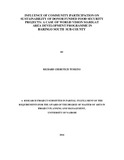| dc.description.abstract | Food security is recognised as one of the growing existential environmental challenges for the
sustainable development of humanity and planet Earth especially in the developing countries
like Kenya. Consequently, some donor funded NGOs have been carrying out food security
programs although in most cases the food security projects collapse after the withdrawal of
NGOs, hence, become unsustainable. Therefore, the purpose of this study was to examine the
influence of community participation on sustainability of donor funded food security projects
using World Vision Marigat ADP in Baringo County as a case. Specifically, it sought to
determine the influence of community contribution, the relationship between adoption of new
technologies, the influence of community involvement in decision making and the extent to
which community involvement in monitoring and evaluation of projects influences
sustainability of World Vision funded food security projects in Kenya. The study was guided
by the Food Availability Decline Approach (FADA) and the Entitlement Approach (EA).
Descriptive survey research design was used targeting the management and staff and farmers
who are beneficiaries of World Vision Kenya food security projects in Marigat ADP in
Baringo County. Both purposive and systematic random sampling were used to obtain a
sample size of 164 respondents. Researcher-administered questionnaire was used as data
collecting instruments. The data was analysed using both descriptive and inferential statistical
methods with the aid of Statistical Package for Social Sciences (SPSS) version 21 computer
software. The findings revealed that that all the independent variables combined could
influence upto 59% change in the sustainability model of the food security projects in the
area. Community contribution (β = 0.286) was significant to the sustainability of the projects
while adoption of new technology (β = 0.631) was the most significant variable of the study.
Community involvement in decision making (β = - 0.273) and in monitoring and evaluation
(β = - 0.093) negatively affected the sustainability of the food security projects owing to the
way they were carried out. All the vaiables were, however, significant to the study and it is
recommended that; the communities in the vulnerable areas and particularly at the family
levels be encouraged through their leadership in all sectors to avail their land and also provide
all necesary support for the food security projects. The government should consider
subsidizing the costs of farm inputs earmarked for the food insecure areas. There is need to
involve most of the farmers at all stages of the planning and implementation of the projects.
Finally, it is salutary to train the farmers on monitoring and evaluation techniques so as to
enable them to keep the progress of the projects in a tractable state even long after the
withdrawal of the donors. The study also recommends that further research should be carried
out on; the challenges of implementing food policies in Baringo County and also the factors
affecting the internal food markets in Baringo County | en_US |

